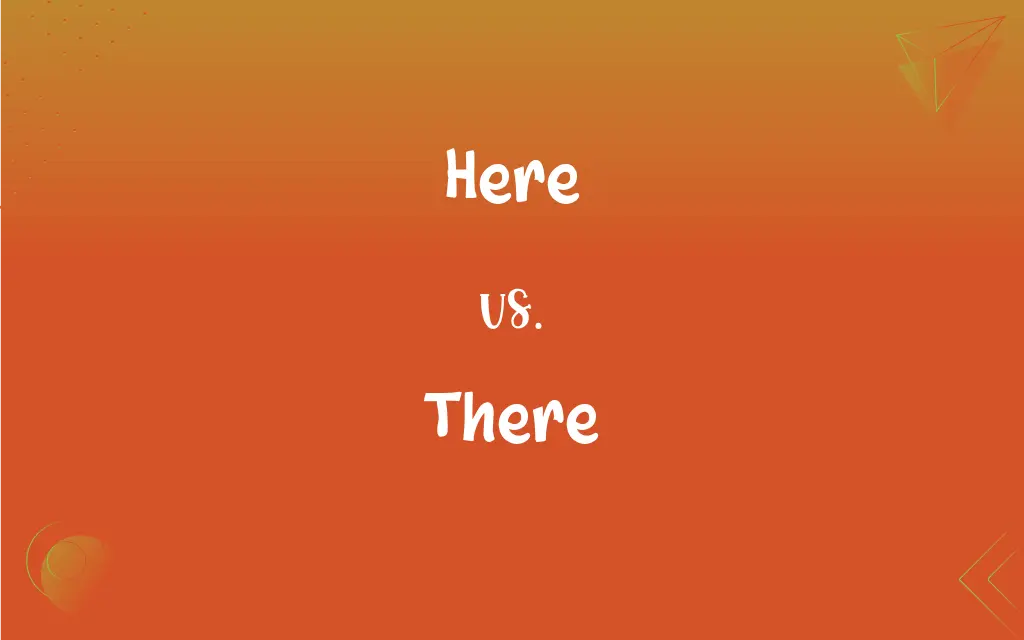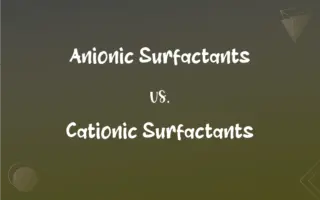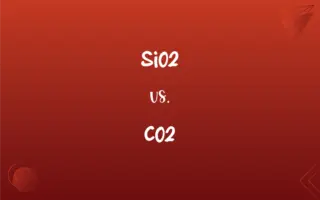Here vs. There: What's the Difference?
Edited by Aimie Carlson || By Harlon Moss || Published on December 6, 2024
"Here" refers to the location of the speaker, while "there" refers to a location away from the speaker.

Key Differences
"Here" and "there" are terms used to denote location or place in relation to the position of the speaker. "Here" indicates a location that is close to or at the same place as the speaker. For example, when someone says, "I am here," they mean that they are present in the immediate location. " On the other hand, "there" indicates a location that is apart from or at a distance from the speaker. When someone says, "You go there," they refer to a place that is not where the speaker is currently located.
The use of "here" and "there" also conveys the speaker's perspective on distance and presence. "Here" suggests inclusivity or involvement in the immediate context, inviting a sense of closeness or participation. It is as if the speaker is saying, "Join me in this place." In contrast, "there" creates a sense of separation or distinction from the speaker's current location, often implying exclusion or an objective point of view about a different place.
Moreover, "here" and "there" play significant roles in the structure of language, serving as adverbs, pronouns, or adjectives depending on the context. "Here" can signal the beginning of an action or event in the present location, as in "Here begins our journey." Similarly, "there" can introduce subjects or topics in a sentence, as in "There is a problem we need to solve," emphasizing the existence of something in a particular location.
The distinction between "here" and "there" reflects the relative and subjective nature of spatial orientation in language. While "here" emphasizes immediacy and proximity, "there" highlights distance and separation. Both words are essential in describing spatial relationships, giving speakers tools to navigate and articulate their experiences of space and presence.
Comparison Chart
Proximity
Close to the speaker
Away from the speaker
ADVERTISEMENT
Implication
Presence, immediacy
Absence, distance
Usage
Indicates current location or inclusion
Indicates a different location or exclusion
Perspective
Subjective, from the speaker's standpoint
Objective, from an external standpoint
Function in Speech
Draws attention to the speaker's position
Identifies or refers to another position
Here and There Definitions
Here
Used to introduce a statement or action.
Here is the book you asked for.
ADVERTISEMENT
There
To refer to a point in an argument or discussion.
There, I've made my case.
Here
To indicate the presence of something.
Here comes the bus.
There
At or in that place.
My house is just there, across the street.
Here
To emphasize a point or moment.
Here, we see the main issue.
There
Used to introduce a subject or topic.
There is something you should know.
Here
At or in this place.
Please sit here next to me.
There
To indicate the existence of something.
There are many options available.
Here
Used in commands or requests for attention.
Look here, you need to listen.
There
Used in commands or to direct attention.
Go there and wait for me.
Here
At or in this place
Stop here for a rest.
There
At or in that place
Sit over there.
FAQs
How do "here" and "there" function grammatically?
As adverbs, pronouns, or adjectives, depending on their use in a sentence.
What does "here" imply in a conversation?
It implies closeness or presence in the speaker's current location.
Can "here" and "there" be used interchangeably?
No, because they refer to different spatial relations relative to the speaker.
What role does context play in understanding "here" and "there"?
Context determines their specific meanings related to location or situation.
Can "there" suggest emotional distance as well as physical?
Yes, it can imply emotional detachment or separation in addition to physical space.
Is "here" only physical, or can it be metaphorical?
It can be both, indicating physical presence or a moment in time.
How can "there" introduce a subject?
By preceding a noun or noun phrase, as in "There is a chance."
Can "there" be used to create a sense of atmosphere?
Yes, describing a place as "there" can evoke a specific setting or mood.
Can "here" indicate a general vicinity or only precise locations?
It can indicate both, depending on how specifically the speaker defines it.
Why might someone use "there" to emphasize a point?
To direct attention to evidence or an example supporting their argument.
How is "there" used differently from "here"?
"There" refers to a location separate from the speaker, indicating distance.
Do "here" and "there" have synonyms with similar nuances?
Yes, but the choice between them can affect the tone or emphasis of a statement.
How do "here" and "there" contribute to narrative storytelling?
They help establish settings, direct attention, and define spatial relationships.
How do "here" and "there" relate to the speaker's perspective?
They are based on the speaker's position, shaping how locations are described.
Can the use of "here" and "there" vary in different dialects of English?
Yes, their usage and implications might vary slightly across English dialects.
How does technology affect the interpretation of "here" and "there"?
Technology, like GPS and virtual meetings, can blur the traditional meanings of these terms.
Is "here" more subjective than "there"?
Yes, because it directly relates to the speaker's immediate location or perspective.
How does the use of "here" affect audience engagement?
It can make the audience feel more included or directly addressed.
Are "here" and "there" used in idiomatic expressions?
Yes, they appear in idioms and phrases that convey more abstract meanings.
How does one choose between using "here" or "there" in writing?
Choice depends on the desired emphasis on proximity or distance and the context.
About Author
Written by
Harlon MossHarlon is a seasoned quality moderator and accomplished content writer for Difference Wiki. An alumnus of the prestigious University of California, he earned his degree in Computer Science. Leveraging his academic background, Harlon brings a meticulous and informed perspective to his work, ensuring content accuracy and excellence.
Edited by
Aimie CarlsonAimie Carlson, holding a master's degree in English literature, is a fervent English language enthusiast. She lends her writing talents to Difference Wiki, a prominent website that specializes in comparisons, offering readers insightful analyses that both captivate and inform.







































































